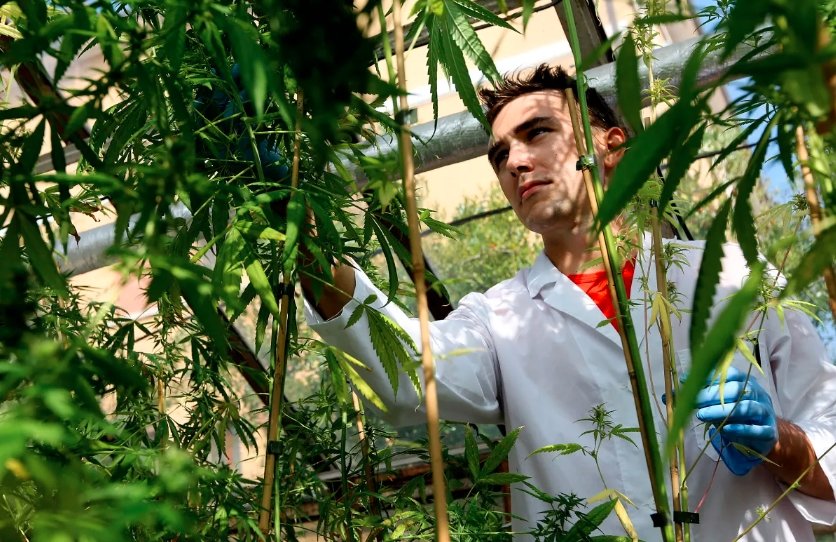The Drug Enforcement Administration (DEA) has asserted its “final authority” on the rescheduling of cannabis, overruling the recommendation of the Department of Health and Human Services (HHS) to reclassify the plant as a Schedule III substance. This move has sparked controversy and criticism from cannabis advocates, lawmakers, and researchers, who argue that the DEA is ignoring the scientific evidence and public opinion on cannabis.
HHS Recommends Schedule III for Cannabis
According to a leaked letter obtained by Bloomberg News, HHS sent its recommendation to the DEA on August 29, 2023, following a directive from President Biden to review the federal status of cannabis. HHS conducted a scientific and medical evaluation of cannabis and concluded that it should be moved from Schedule I, which is reserved for drugs with no accepted medical use and high potential for abuse, to Schedule III, which includes drugs with moderate to low potential for abuse and accepted medical use.
HHS cited several factors for its recommendation, such as the increased availability of cannabis products in states that have legalized it for medical or recreational purposes, the growing body of research on the therapeutic benefits and risks of cannabis, and the international treaty obligations that allow for the medical use of cannabis. HHS also noted that rescheduling cannabis would facilitate more research and development of cannabis-based medicines, as well as reduce the legal barriers and stigma associated with cannabis use.
DEA Rejects HHS Recommendation, Maintains Schedule I for Cannabis
However, the DEA did not accept the HHS recommendation and instead decided to keep cannabis in Schedule I, claiming that it has the “final authority” to schedule or reschedule drugs under the Controlled Substances Act (CSA). The DEA said that it conducted its own review of cannabis, using a different set of criteria than HHS, and found that cannabis does not meet the requirements for Schedule III or any other schedule.

The DEA argued that cannabis has a high potential for abuse, as evidenced by the prevalence of cannabis use disorders and the increasing potency and diversity of cannabis products. The DEA also claimed that cannabis has no currently accepted medical use, as there are no FDA-approved cannabis products and the evidence for its efficacy and safety is insufficient and inconsistent. The DEA further stated that cannabis is not accepted by qualified experts and that the scientific evidence is not widely available.
The DEA also cited international treaty obligations as a reason to keep cannabis in Schedule I or II, saying that moving it to a lower schedule would violate the 1961 Single Convention on Narcotic Drugs, which requires signatories to limit the production, distribution, and use of cannabis to medical and scientific purposes. The DEA said that it consulted with the State Department and the International Narcotics Control Board (INCB) and determined that rescheduling cannabis would have “significant negative consequences” for the U.S. and its allies.
Cannabis Advocates, Lawmakers, and Researchers Criticize DEA Decision, Call for Descheduling Cannabis
The DEA decision has been met with strong opposition and disappointment from various stakeholders, who accuse the agency of being out of touch with the reality and the science of cannabis. They also call for a more comprehensive and sensible approach to cannabis policy reform, such as removing cannabis from the CSA altogether and allowing states to regulate it as they see fit.
Cannabis advocates, such as NORML, MPP, and DPA, said that the DEA is ignoring the will of the majority of Americans, who support legalizing cannabis for medical or adult use, and the experience of dozens of states, who have successfully implemented cannabis programs that benefit patients, consumers, and communities. They also said that the DEA is hindering the advancement of cannabis research and innovation, as well as the development of new and better cannabis products and treatments. They urged Congress to pass legislation that would end the federal prohibition of cannabis and respect the rights of states and individuals to make their own choices about cannabis.
Lawmakers, such as Rep. Earl Blumenauer (D-OR), Sen. Cory Booker (D-NJ), and Sen. Ron Wyden (D-OR), also expressed their frustration and dissatisfaction with the DEA decision, saying that it is based on outdated and biased views and that it contradicts the scientific consensus and the medical reality of cannabis. They also said that the DEA is wasting its resources and time on enforcing a failed and harmful policy that disproportionately affects people of color and low-income communities. They reiterated their commitment to passing legislation that would deschedule cannabis and end the federal war on cannabis.
Researchers, such as Dr. Sue Sisley, Dr. Ethan Russo, and Dr. Ziva Cooper, also criticized the DEA decision, saying that it is not supported by the current and emerging evidence on the therapeutic potential and safety profile of cannabis. They also said that the DEA is creating unnecessary and unreasonable barriers and challenges for conducting cannabis research, such as limiting the sources and varieties of cannabis available for study, imposing excessive and arbitrary regulations and restrictions, and delaying and denying the approval of research proposals and protocols. They appealed to the DEA to reconsider its decision and to collaborate with the scientific community to facilitate and promote cannabis research.



